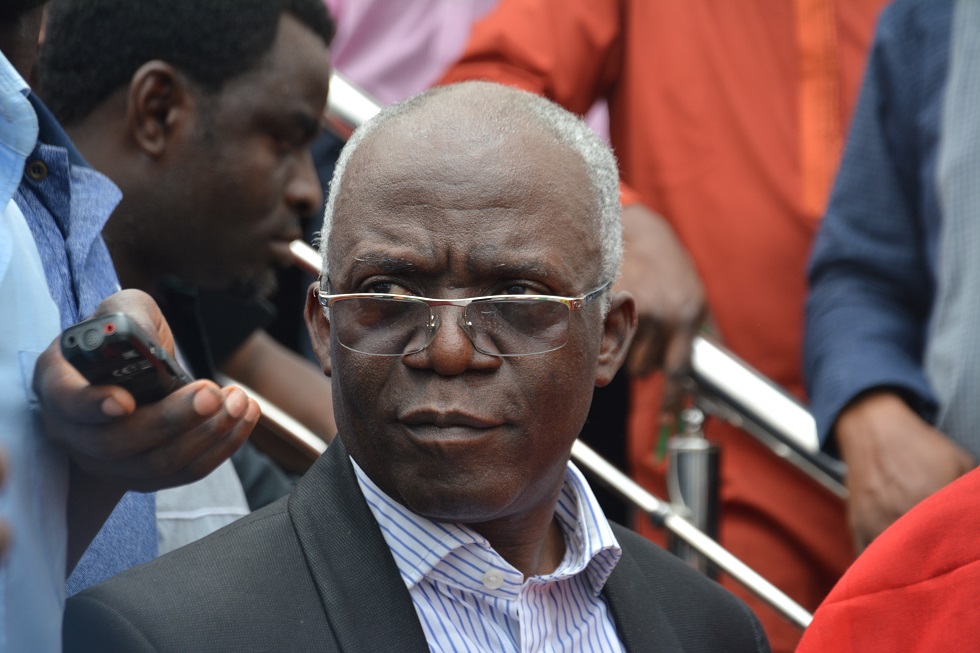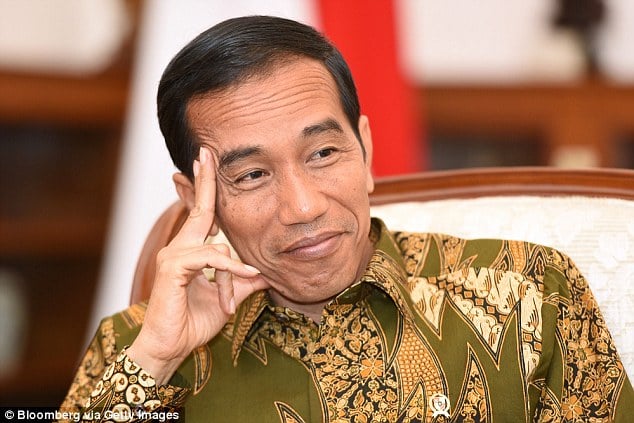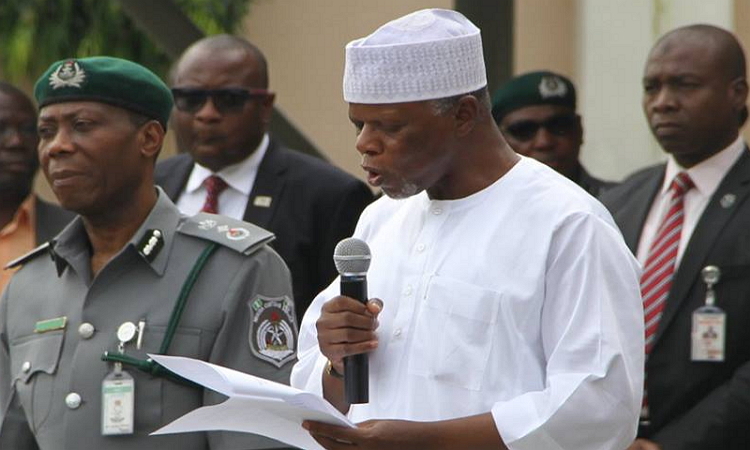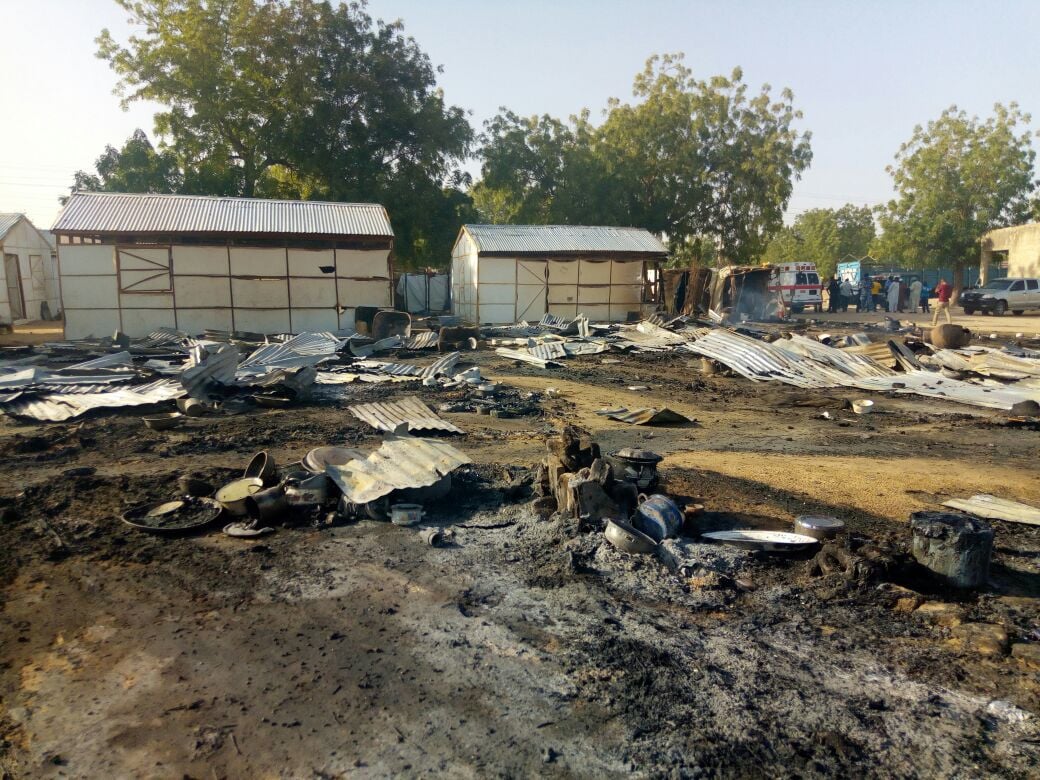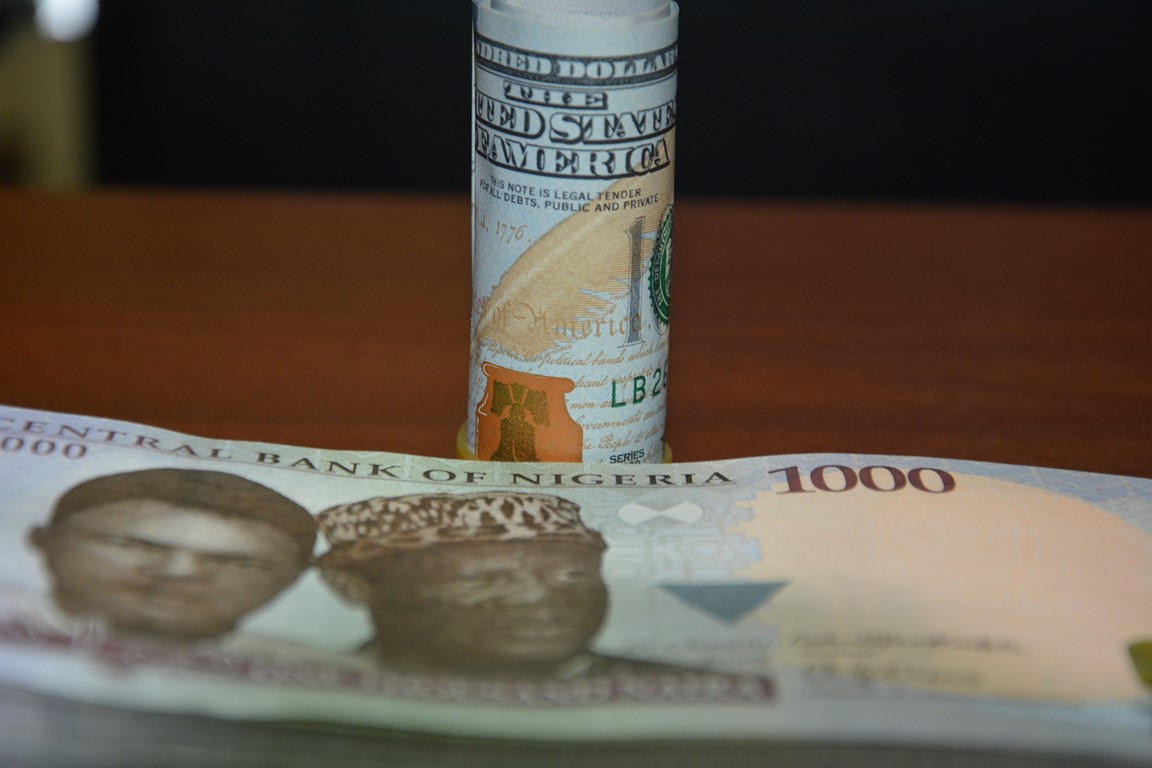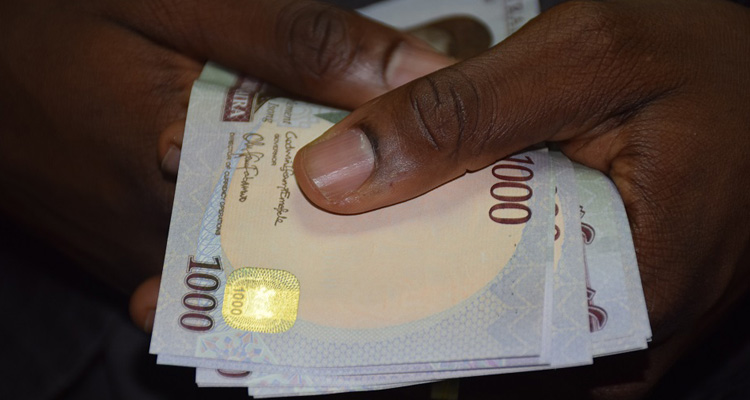Femi Falana, human rights lawyer and senior advocate of Nigeria (SAN), has alleged that President Muhammadu Buhari’s ministers colluded with IMF in a “dubious experiment”, which he said ruined the naira.
In this interview with THISDAY, Falana spoke on various issues facing the country at this point in time.
He lamented the disobedience of court orders, the arrest of judges, Ibrahim Magu’s confirmation as EFCC chairman and the Customs-Ali uniform saga.
Excerpts from the interview below:
Advertisement
There are so many complaints about legal practice today, including long delays in court process especially in the Court of Appeal and Supreme Court, some judges not even understanding some of the issues that they are faced with in litigation, to mention but a few. What do you think should be part of the new Chief Justice of Nigeria’s priority list with regard to reforming the Judiciary?
Falana: The appellate courts are unnecessarily congested with appeals, due partly to lack of proper case management. Ours is the busiest Supreme Court in the world. Because we are operating a unitary federal system, matters which arose from the customary courts, area courts and magistrates courts are fought up to the Supreme Court. The government is not helping matters as every trivial legal dispute is taken to the Supreme Court.
The South African government has just withdrawn the bill to legitimise the withdrawal from the ICC, on account of the judgement of a high court. Even the cantankerous President Donald Trump, did not pursue the appeal over the legal validity of his travel ban beyond the Court of Appeal. If it were here, the government would have challenged the decisions of the lower courts up to the Supreme Court.
Advertisement
Before the 2011 amendment of the nation’s Constitution, appeals arising from governorship elections terminated at the Court of Appeal. But the Supreme Court under Chief Justice Aloysius Katsina-Alu conspired with the leadership of the NBA, to acquire jurisdiction to entertain appeals from governorship elections in the 36 states. Today, the apex court is congested with appeals arising from pre-election and post election matters pertaining to governorship elections. The court also entertains appeals from State and National Assembly elections conducted in the 36 states and the Federal Capital Territory.
Another issue which contributes to congestion of cases, has to do with the guideline for the rank of SANs which stipulates that every applicant must submit not less than 3 Supreme Court cases. That has led to a situation whereby lawyers are instigating and funding frivolous appeals in order to meet the prerequisite for SANship.
Since the practice of the Supreme Court is similar to that of the Court of Appeal, I have suggested that the number of cases handled in the Court of Appeal be increased to 7 instead of 4 so that applicants should be asked to either submit 7 Court of Appeal cases or 3 Supreme Court cases with 4 Court of Appeal cases. If you do that, the number of frivolous appeals filed in the apex court will be substantially reduced.
In the area of case management, our appellate courts have to be up and doing. The last time I was at the Supreme Court, the lawyers in one political case were allowed to spend over one hour just to announce appearances, because they flooded the place with so many lawyers. Why should that be so?
Advertisement
The new Chief Justice, the Honourable Justice Walter Onnoghen has expressed concern over interlocutory appeals. With respect to his Lordship, I think the problem has to do with case management by our courts. Even though our courts are required to grant leave in the majority of interlocutory appeals, it is automatically granted once the application for leave is not challenged by the opposing counsel. If our courts are however prepared to exercise the discretion which the Constitution has conferred on them, they would decongest the Courts.
Do you think that the DSS Raids against the Judiciary has achieved anything positive?
Falana: Even though I support the fight against corruption, I can never endorse the nocturnal raid of the official quarters of judges and the homes of other citizens accused of corruption or any offence whatsoever. During the second coming to power of military dictators in Nigeria from 1983-1999, the National Security Organisation which later metamorphosed to the State Security Service, otherwise called DSS, regularly raided my home and office. On one occasion, I was abducted and dumped in the bush along the lonely Epe road. Simultaneously, the late Dr. Beko Ransome-Kuti was kidnapped and dumped at Ijanikin along Badagry road.
To our utter chagrin, the SSS denied any involvement in our abduction. Although we dismissed the official denial of the SSS, I later met a detained military officer in Kuje prisons in 1992, who informed me that our abduction was carried out as part of the preparation for the Gideon Orkar-led coup which was staged on April 22, 1990. Can you believe that our abductors wanted to incite the human rights community against the Babangida junta which they wanted to overthrow?
Advertisement
As kidnapping has become rampart in the country, corruption may fight back by recruiting criminal elements to wear masks and abduct innocent judges at night and kill them, and thereby embarrass the Buhari administration. It happened in Ghana under the military dictatorship led by Jerry Rawlings, when 4 judges including a nursing mother, were abducted at night and brutally murdered. To avert such an ugly scenario, I have cautioned the SSS to desist from further raiding the homes of judges at night.
NBA and disobedience to Court Orders
Falana: As a matter of urgency, the NBA ought to prevail on the Federal Government to comply with the several court orders that are being treated with contempt by the Federal and State Governments. I cannot fathom how a democratic government, can defy the orders of court directing that detained political detainees be released absolutely or that criminal suspects be granted bail. Nigeria has since joined the bad company of countries that disobey the orders of the ECOWAS court. Under the Goodluck Jonathan administration, the then Attorney-General of the Federation, Mr. Mohammed Bello Adoke, SAN ensured that court orders including those of the ECOWAS court were obeyed.
Advertisement
I have tried, in vain, to impress it on his successor, Mr. Abubakar Malami, SAN, to prevail on the Federal Government to observe the rule of law and comply with court orders. The NBA should wake up from its lethargy in the face of incessant disobedience to court orders. If the NBA under the presidency of Alao Aka-Bashorun could boycott courts over the flouting of a single court order by a military dictator, the current leadership cannot afford to remain indifferent to executive lawlessness under a democratic dispensation.
Corruption in the Courts
Falana: It has to be realised that we cannot successfully fight judicial corruption, if we fail to stop the service of originating processes through extortion by court bailiffs, the execution of judgements through extortion by deputy sheriffs, the compilation of records of appeal through extortion by the record section and obtaining judgements of courts through extortion by court registrars. It is often said that the court is the last hope of the common man. This is a myth in every capitalist society like Nigeria, where the common man is economically disabled to access the court for redress. Within the ambit of a neo-colonial legal system, the judiciary has performed fairly well. But the judiciary has not impacted on the masses of our people. We have over 40,000 poor people who are languishing in prison custody because their cases are awaiting trial in the criminal courts. But all attention is largely concentrated on the High Courts and the Appellate Courts patronised by the elite constituted by a tiny fraction of the society.
Advertisement
How do you rate the Buhari Regime so far?
Falana: There is no doubt that the Buhari administration inherited a country that had been run aground by a dangerously corrupt and visionless ruling class. But because the ruling APC believes in the ideology of underdevelopment canvassed by imperialism, it has embraced the rein of market forces. Personally, President Muhammadu Buhari is vehemently opposed to the devaluation of the national currency, but his cabinet members who are largely neo-liberal ideologues, colluded with the IMF to dollarise the economy.
At the end of the dubious experiment of the regime, the national currency has been ruined. Whereas, section 16 of the Constitution states that the government shall control the national economy in a manner that the commonwealth shall not be concentrated in the hands of a few people, the regime decided to hand over the economy to market forces and the private sector.
Advertisement
Even though we are told by the apostles of market fundamentalism that the government has no business in business the government, government was made to sell our common patrimony to selected private sector players, provide them with intervention funds, huge loans from commercial banks, duty waivers and tax incentives. The same government has had to set up the Asset Management Corporation of Nigeria (AMCON) to buy off the toxic loans of the rich. Today, AMCON is battling to recover N5.4 trillion in loans incurred by about 50 private sector players. Is that how to run a private sector driven economy?
The Federal Government has just concluded plans to give another intervention fund of N700 billion to the discos and gencos, in addition to the N300 billion given to them when they bought the assets of the PHCN.
The solution to the gross mismanagement of the economy and the crisis of poverty and insecurity is well captured in chapter 2 of the Constitution. The Constitution decrees that the welfare and security of the people, shall be the primary purpose of the government. To that effect the Constitution states that the economy shall be centrally planned and controlled by the State, to promote the welfare and happiness of the people, guarantee free education and health, provide shelter for the people, ensure that a living minimum wage, pension and unemployment benefits are paid.
Whereas the fundamental objectives and directive principles enshrined in the Constitution are realisable under a socialist economic system the Buhari regime has decided to consolidate the neocolonial and peripheral capitalist system, which has destroyed the economy and compounded the crisis of underdevelopment. Unless the government reverses the trend, invests in the people, empowers them and mobilises them to manage the affairs of the country, we can never fix any of the major problems plaguing the nation.
What do you think about the fight against corruption? Do you think it has had any positive impact so far? It is almost 2 years since this regime assumed office. Do you think that if there are significant prison convictions arising from this fight against corruption, it will serve as a deterrent? What else do you think Government can do to make the fight more effective? Do you think that this Government can stamp out corruption?
Falana: You cannot seriously fight corruption in a capitalist state, because capitalism is nurtured and sustained by corruption and fraud. Unknown to the government, the western countries are the most corrupt nations on earth. But they turn round to label us as corrupt. Meanwhile, the bulk of the looted wealth of Africa is domiciled in western banks and other financial institutions.
They have also created dens of robbers in remote tax havens and set up secret accounts and offshore companies as revealed in the Panama papers. Through the repatriation of profits raked from Africa, multinational companies are allowed to engage in capital flight. These corrupt activities of western governments and corporate bodies are legitimate under a capitalist system. Therefore, a government which cannot see through such fraud perpetrated by imperialism, cannot seriously confront the menace of corruption. All the same, the feeble fight against corruption by the Buhari administration ought to be critically supported. All stolen funds should be recovered, and spent on fixing a number of hospitals, schools and job creation.
With respect to the conviction of politically exposed persons, some progress has been recorded by the administration. A former Governor and Finance Commissioner have been jailed in Adamawa State. A former DG Of NIMASA has been convicted and sentenced to 5 years imprisonment. Some Local Government Chairmen have been jailed in Kogi and Kaduna States. A number of subsidy fraud suspects have been jailed and ordered to refund huge sums of money.
With the aid of the Administration of Criminal Justice Act, 2015, many other corruption cases will soon be concluded. But then the trial courts have to ensure that defence counsel do not subject witnesses to unending crossexamination, which is the new stratagem employed by senior lawyers to frustrate the prosecution of corrupt big guys.
No capitalist government can stamp out corruption, but the government can do much more than it is doing. In particular, the government has to ensure the passage of the bill for the establishment of a special court to fight economic and financial crimes, including drug trafficking and human trafficking, corruption and money laundering, terrorism and kidnapping. The regular courts are congested with so many other cases, that the system needs a special court to deal ruthlessly with the mega looting of the treasury. If the government wants to be taken seriously in the fight against corruption it has to remove and prosecute corrupt elements in the corridors of power. In other words, the Secretary to the Government of the Federation, Ministers and Military Chiefs who have been fingered in the miasma of corrupt practices, should be removed and prosecuted.
Your stance on corruption is very well known. How, in your view, has the Prof Sagay Presidential Advisory Committee Against Corruption fared in its crucial assignment to rid the nation of corruption?
Falana: The Presidential Advisory Committee Against Corruption led by Professor Itsejuwa Sagay has given a direction to the anti-corruption policy of the Federal Government. It has organised programmes for judges, prosecutors, faith based organisations, the labour movement and other civil society bodies, with a view to repositioning the society in the fight against corruption. It has also brought up petitions alleging corrupt practices, which were hitherto suppressed by the anti- graft agencies. In defending the anti-corruption policy of the government, its chairman, Professor Sagay, has not hesitated to indict corrupt government agencies. To that extent, I believe that the Committee has discharged its duty.
Happily, those who vehemently disagree with the involvement of the Committee in some controversial issues, have not hesitated to join issues with the Chairman, Professor Sagay.
Do you agree with the recent nomination of the 9 lawyers to the position of Justices of the Supreme Court?
Falana: The appointment of lawyers as Justices of the Supreme Court is a vexed issue in all common law countries. The appointment is rarely made because of the complexities involved. The last time the United States government did so was 25 years ago. In the last 67 years, India has appointed only one lawyer to the Supreme Court bench. The United Kingdom has appointed only one lawyer to the Supreme Court bench. The last time a Nigerian lawyer, the late Augustine Nnamani, was appointed as a Supreme Court Judge, was about 28 years ago.
We need to find out why such appointment was stopped. It was found that upon leaving the law school, lawyers decide to either go to the bench or opt for legal practice. Having done well in legal practice you are able to reach the apogee of your carrier by becoming a SAN. Your colleague who opted for the bench has been elevated to the Court of Appeal. If there is a vacancy in the Supreme Court it is logical and fair that the Justice of the Court of Appeal be appointed to the apex court.
That is the height of his judicial career. But the NBA has intervened to make a case for a SAN to fill the vacancy. The question is whether it is fair to allow lawyers who have become SANs, to be appointed as Justices of the Supreme Court and thereby, frustrate the Justices of the Court of Appeal from the same geopolitical zone. Of course, it has been contended that the late Justice Taslim Olawale Elias, was appointed from the University of Lagos. But thereafter, the system compelled other academics like the late Justice Niki Tobi and Chike to commence their judicial career in the High Court. I also know not less than 3 judges in the National Industrial Court were in the universities before their elevation. It has also been said that some high court judges were appointed to the Supreme Court.
At that time, there was no Court of Appeal. It was only the Western State that had a Court of Appeal. The late Justice Kayode Eso had served in the Western State Court of Appeal, before his elevation to the Supreme Court. Having regard to our history and the justice of the matter I am of the firm view that lawyers who want to join the Supreme Court bench, should start their judicial carrier from the High Court bench.
What about your recommendation that lawyers who are being investigated for corruption should be suspended from practice, pending the outcome of their cases? Would it not be prejudicial to the cases they are handling, knowing that some of them may actually be proven innocent?
Falana: It is not my idea. I was only referring to one of the guidelines for the rank of Senior Advocates of Nigeria, which provides that a SAN who is under criminal trial may be interdicted pending the conclusion of the case. That is the practice in the public service. The judges who are currently standing trial, have been suspended from service. A few years ago, some Senior Advocates were suspended pending investigation of the allegations against them. A former Attorney-General was even suspended for abuse of office. There is nothing prejudicial about it, as whoever is suspended, is entitled to automatic reinstatement, if discharged and acquitted by a criminal court.
Nigeria is in a bad state. Many are not happy with the performance of the Ministers. Do you think that it is a better system to give intended Ministers their portfolios before they go for Senate screening, so that their antecedents in those fields and roles that they have been nominated to play, will be known to all before they are confirmed?
While it is desirable to attach portfolios to offices it is not a panacea for good performance in office. I fully agree with the wife of the President, Mrs Aisha Buhari when she said that the government has been hijacked by a clique of power mongers. The Kaduna State Governor, Malam Nasir Elrufai has just voiced out his own frustration over the slow pace of the Buhari administration. He even mentioned the names of some of the people involved in pulling back the hand of the clock of the government.
Do you blame Ministers who are prevented from performing their duties? Recently, the Vice President, Professor Yemi Osinbajo acted briefly for the President. Nigerians including President Buhari, have commended him for the matured way he handled the affairs of the State. If the little progress recorded is to be sustained, President Buhari has to take control of the government. Right now there is no coordination. Hence a security officer is allowed to sabotage the President by asking the Senate to reject his nominee.
Do you think that it is constitutional for certain states in Nigeria to officially adopt Sharia Law as their State Law and even practice the criminal aspects of the law given the provisions of Sections 10 and 277 of the 1999 Constitution of the Federal Republic of Nigeria?
Falana: The Constitution has prohibited the adoption of any religion as a state religion. Therefore, no state government is permitted to adopt a criminal law based on any religion. But we cannot talk about that particular law in isolation. If President Obasanjo had challenged the Governors who adopted the Sharia criminal law, he would have been questioned for building a chapel in the presidential villa. He even appointed a chaplain who was paid from the public treasury.
Regardless of political parties, the Federal and State Governments in Nigeria have built chapels and mosques in government quarters. On a yearly basis, they sponsor pilgrims to Mecca and Jerusalem with public funds. Even the Central Bank of Nigeria permits pilgrims to buy dollars below the official rate. Even a government led by a Christian was alleged to have given over N4 billion to a marabout for spiritual consultation.
All these actions of the government are illegal and unconstitutional. Unless religion is made a private affair in line with the letter and spirit of the Constitution, we cannot limit our condemnation to illegal adoption of what President Obasanjo once referred to as “Political Sharia” by some former northern governors.
What do you think is the solution to the problems between the Niger Delta and Government? Do you think that there is any justification for their agitation?
Falana: For the past 50 years the Nigerian ruling class relied on oil wealth from Niger Delta region to run the government. In the process of producing oil, the region has witnessed unprecedented environmental pollution and degradation. The government and the oil companies have completely neglected the development of the region. The criminal neglect has led to agitations by the youths leading to the emergence of militant groups that have taken up arms against the State.
Unfortunately, the blowing up of pipelines by the youths, has compounded the crisis of environmental degradation in the region. In fact, it will take about 30 years to reclaim the degraded Ogoni land. It is hoped that the Buhari government will pursue the peace initiative and stop the mindless military attacks of the region. The pledge of $1 billion by the oil companies towards the development of the Niger Delta, is a tip of the iceberg. The oil companies should be made to contribute not less than $50 billion to the development of the region. The decision of the Federal Government to recall contractors to complete abandoned contracts or refund funds collected by them should be carried out. Henceforth, the people should be involved in the planning and execution of development projects in the region.
You have been campaigning for the release of Nnamdi Kanu, El Zakzaky and Sambo Dasuki. Given the gravity of their offences, would you say your call for their release is well thought out and in the interest of the country?
Falana: In the case of Elzakzaky and his wife, the Federal High Court ordered that they be released unconditionally, and awarded damages of N50 million to them. They have not been linked with the commission of any criminal offence. Although Colonel Dasuki is accused of the criminal diversion of public funds, he has been granted bail by the Federal High Court and the High Court of the FCT three times.
The ECOWAS court has also directed the Federal Government to release him on bail. Nnamdi Kanu was also granted bail which was ignored, before the Federal Government decided to charge him with treasonable felony. I have not said that Colonel Dasuki should not stand trial. With respect to Kanu, I am of the view that the Federal Government should dialogue with the members of the Indigenous People of Biafra, if it could negotiate with the Niger Delta Avengers and even some of the terrorists leading to release of 21 of the abducted Chibok girls.
You have been a consistent and committed advocate of reforms in the legal profession in Nigeria. With the ongoing sittings of the NBA Rules Reform Committee chaired by Chief Idigbe, SAN, what in your candid view needs, to be reformed?
Falana: The problems of our legal practice are a legion. The Nigerian Bar Association has just decided to address them. The NBA president, Mr. A. B. Mahmud, SAN appears determined to tackle the problems. I know that the Chairman of the Reforms Committee, Chief Tony Idigbe SAN has taken the assignment very seriously. At the end of the exercise, I hope an implementation committee will be set up to ensure that the recommendations are not dumped in the archives. But the NBA can only succeed, if it is prepared to democratise its affairs.
Right now, the NBA is dominated by a coterie of senior lawyers. The NEC is largely peopled by the close friends of the NBA president. A few of them are our representatives in the National Judicial Council. The Constitution says that 5 legal practitioners shall represent the NBA in the NJC at least one of whom shall be a SAN. But all our 5 reps are SANs. And they are all men. From the same group there are life benchers. How can you become a life bencher at the age of 45 or 50 years? In an association of over 100,000 members, it is undemocratic to confer life membership of any of the statutory bodies on a handful of selected senior advocates.
For many years, you have engaged in public interest litigation, suing the Government of Nigeria on many fronts on issues ranging from education and health, to social infrastructure. With the knowledge that Chapter 11 of the 1999 Constitution on Fundamental Objectives and Directive Principles of State is not justiciable, what has been the experience, in your quest to ensure that the common man is not deprived of his rights?
Falana: Even though the bourgeois Constitution of Nigeria has made it impossible to enforce socioeconomic rights of the Nigerian people, we have found a way around it. Through struggle, we have compelled the State to enact some legislations for the actualisation of the provisions of the chapter. Such laws have provided for a national minimum wage, compulsory pension for all employees, a bank to grant loans to underprivileged citizens without collateral, a bank to grant loans to needy undergraduates, a national health insurance scheme, immunisation for every child, a commission to ensure free and compulsory basic education up to junior secondary school for every child, a commission to wipe out adult illiteracy, establishment of mortgage institutions and a fund for housing, a committee to ensure the implementation of the national budget etc.
Unlike chapter 2 of the Constitution, the right to development and socio-economic rights guaranteed in the African Charter on Human and Peoples Rights, which have been domesticated by Nigeria are enforceable in our courts. In a number of cases we have successfully tested the provisions of these welfare laws. I have just completed a book on Nigerian Law on Socioeconomic Rights which will be publicly presented next month. The book was informed by the tremendous success we have recorded in the promotion of public interest litigation.
Lately, Lagos State introduced the death penalty as punishment for kidnappers whose victims die in the course of the kidnap. The State felt that decisive action needed to be taken, not just as punishment, but to also serve as a deterrent to would-be kidnappers. Do you agree with this?
Falana: I believe that the Lagos State Government was not properly advised on the barbaric extension of the death penalty to cover the offence of kidnapping. Even though we have been killing convicted armed robbers since 1970, armed robbery has been on the ascendancy. The government can only stop or minimise violent crimes, if it is prepared to address the unemployment of our youths. Apart from addressing the crisis, the Lagos State Government should abolish the death penalty, since no prisoner on death row convicted by the Lagos State High Court has been executed since 1999. Majority of them have had their sentences commuted to life imprisonment or lesser terms.
Secondly and more importantly, the Lagos High Court (per Olokooba J.) held in Ajulu & Ors. v AG, Lagos State that while the death penalty is not unconstitutional, the execution of a death sentence is unconstitutional as it violates the fundamental right of convicts to freedom from torture. On the basis of that judicial decision, it is illegal to carry out the execution of the death penalty in Lagos state.
As a member of the Inner Bar, one would understand the rigours you went through to get there. To the surprise of many, you are now campaigning for two extreme options of either abolishing the rank or democratising it, to make it available for any lawyer who meets the basic criteria. Kindly, shed some light on what informed your bold views on this highly emotive issue.
I have never believed in the classification of lawyers into inner and outer bar. Having become a SAN, no one can accuse me of campaigning for abolition because I am not one. However, if it is not going to be abolished for now, the process of the award has to change. What I mean is that the rank has to be democratised. Under the current practice in the United Kingdom where we copied the practice, the rank of Queen’s Counsel is automatically conferred, as of right, on all legal practitioners who satisfy the laid down prerequisites. This is also the practice in Canada and Jamaica. In those countries, the award process has eliminated the exercise of discretion, political consideration and undue influence. It is high time we adopted the democratic process which is in line with section 42 of the Constitution, which has abolished any form of discrimination.
So much is going on in your State, Ekiti, that many have continued to ask ‘When will Falana come out to run for governorship again?” Will you hearken to the yearnings of the Ekiti people this time?
Falana: I am following developments in Ekiti State. The last time I did some costing I found that I would have to look for N3 billion if I want to contest for the governorship of a poor state like Ekiti. I have given up the idea, since I cannot possibly raise such amount of money without compromising my ideological stand. I am currently involved in the larger struggle of retrieving our country from the soiled hands of corrupt political buccaneers and their imperialist masters.
What is the significance of whether the Comptroller-General of Customs wears uniform or not? Why do you think that the Senate is so insistent that he must wear uniform?
Falana: The senate is exposing Nigeria to ridicule in a bid to humiliate certain public officers. For goodness sake, why has the dress of a head of a parastatal become such a big national issue? Is the senate relying on the Constitution or its own rules of procedure? It does appear that the senate does not appreciate the limit of its power. In many countries including South Africa, customs officers are not required to wear uniforms. In Nigeria the wearing of uniforms by a number of so called paramilitary agencies, was designed to intimidate the civilian population.
While serving customs officers are required to wear uniforms, no law provides that the head of the agency shall wear any uniform if he or she is not a customs officer. The same forces who didn’t want Colonel Hameed Ali as the head of the Customs Service, had challenged his appointment in court. The case has just been dismissed by the Federal High Court which held that the President cannot be compelled to appoint a serving customs officer as the Comptroller-General of Customs. Since a competent court has ruled that he is not a customs officer, why is the senate asking him to wear the uniform of a serving customs officer? The wearing of uniform is not provided for in the Customs and Excise Act, but in the conditions of service issued by the Board. According to the service conditions, the officers required to wear uniforms are commissioned officers. Is the senate saying that Colonel Ali has become a commissioned officer?
Kindly, comment on the Senate’s rejection of the nomination of Ibrahim Magu for the position of EFCC Chairman. What is your recommendation on the way forward on this issue?
Falana: It is indubitably clear that the Senate is hell bent on making a mockery of the anti-corruption crusade of the Buhari administration. In this regard, the senate has amended the Code of Conduct Bureau and Tribunal Act, it has attempted to confer immunity on the members. It has intimidated the government to withdraw the forgery charge against its leaders. Not too long ago, the senate insisted on the removal of Mr. Ibrahim Lamorde as EFCC Chairman. We were told that he could not account for recovered assets worth over a trillion Naira.
As soon as he was removed, that was the end of the monstrous allegation. This time around, the Senate has recruited the SSS to discredit the EFCC Acting Chairman, Mr. Ibrahim Magu. As far as I am concerned, the controversy should end as soon as possible. My position is that President Buhari should put his house in order if he wants to re-present Mr. Magu to the Senate. Alternatively, he may ask Mr. Magu to continue to act pursuant to section 171 (1) (d) of the Constitution and section 11 of the Interpretation Act, which have empowered him to appoint the head of any extra ministerial department to hold office in an acting capacity.
The third option is to appoint another person, since the Senate is not going to confirm the appointment of Mr. Magu. But the messy affair requires strategic thinking on the part of the government. How can a security officer sabotage the President of the Republic of Nigeria in such a reckless manner? As a matter of urgency, President Buhari should take over the control of the government. If it wants to be taken seriously in the fight against corruption, the government should reorganise the entire graft agencies including the ICPC, CCB, NAFDAC, NDLEA etc. There is so much attention on the EFCC. This has to change, and it can only change if the other agencies are made to function effectively.
Add a comment
